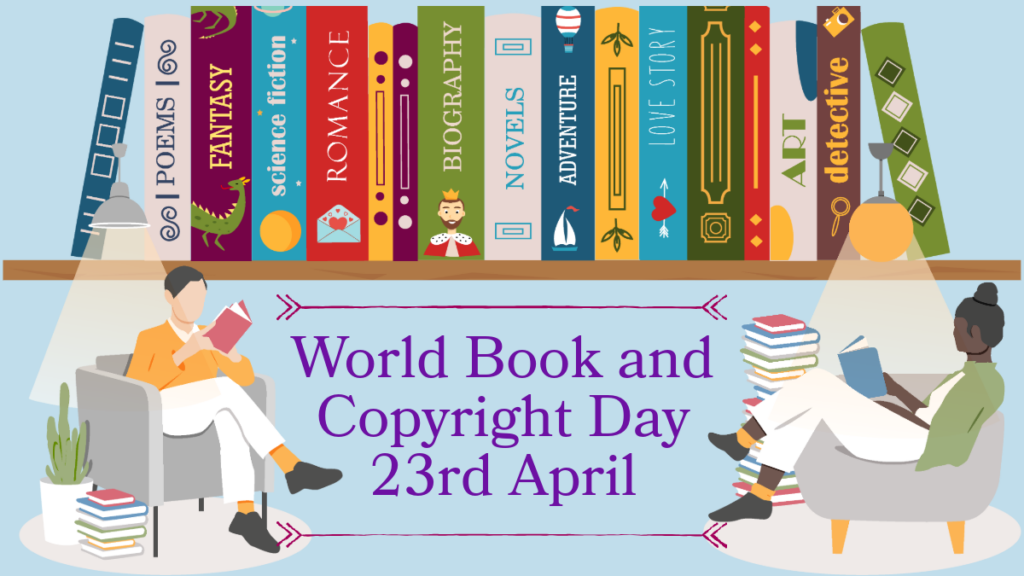World Book and Copyright Day 23rd April
On the 23rd of April each year, UNESCO (United Nations Educational, Scientific and Cultural Organization) celebrates World Book and Copyright Day.

The death anniversary of William Shakespeare, Miguel Cervantes and Inca Garciloso de la Vega as well as the birth or death of several prominent authors, was chosen in 1995 by UNESCO to become the World Book and Copyright Day. That date is 23rd April.
The day in itself is a celebration of everything relating to books but also to highlight the importance copyright has in the dissemination of some of our favourite reads.
Thanks to copyright, thousands of authors and publishers around the world can publish works that enrich society, through creativity, diversity and access to knowledge.
Copyright is an Intellectual Property (IP) right which allows the creator of an original work, certain economic rights as well as the right to modify, adapt, and disseminate the work. Copyright is automatic and in the UK it lasts for the lifetime of the author plus 70 years.
Copyright protects different categories of work, from literary, dramatic, artistic and musical works, films and sound recordings as well as broadcasts and typographical arrangement.
Books fall into the literary works spectrum. However, sometimes a book can have multiple types of works included.

Using certain material from a book can sometimes become problematic. Multiple rights holders, means multiple people to request permission from. At times, a publisher might own the copyright and using the material in any way would mean that permission must be requested from publishers which also could mean paying a fee.
While copyright was created to protect creators and their original work, it has become a way for publishers to keep the power over the creations. Alexander Pope described it this way:
What Authors lose, their Booksellers have won,
So Pimps grow rich, while Gallants are undone.
While during Pope’s time, publishers indeed had a lot more power over authors, nowadays, with Open Access for publications, the authors can keep the copyright to their creations and share them widely for the enjoyment and use of the public.
Have a look below at the multiple resources available at Loughborough as well as the multitude of free resources, either because they have been published Open Access or because copyright expired, and they are now part of the public domain.
Loughborough University Catalogue
Authors, copyright, and publishing in the digital era / by Francina Cantatore, 2014
Judiciary-friendly forensics of software copyright infringement / Vinod Polpaya Bhattathiripad, 2014
Piracy the intellectual property wars from Gutenberg to Gates / Adrian Johns, 2010
Publishing law Hugh Jones and Christopher Benson, 2014
Rethinking copyright history, theory, language / Ronan Deazley, 2006
The copyright wars three centuries of trans-Atlantic battle / Peter Baldwin, 2014
The digital rights movement the role of technology in subverting digital copyright / Hector Postigo, 2012
The EU Artificial Intelligence Act regulating subliminal AI systems / Rostam J. Neuwirth, 2022
Wired shut copyright and the shape of digital culture / Tarleton Gillespie, 2007
Directory of Open Access Books
Copyright’s Broken Promise – Willinsky, John (2022)
Copyright and Cartography – Alexander, Isabella (2023)
Copyright, the Freedom of Expression and the Right to Information – Mendis, Sunimal (2011)
The Copyright Pentalogy : How the Supreme Court of Canada Shook the Foundations of Canadian Copyright Law – Michael Geist (2020)
The Digital Public Domain: Foundations for an Open Culture – Dulong de Rosnay, Melanie; De Martin, Juan Carlos (2012)
The Greatest Films Never Seen: The Film Archive and the Copyright Smokescreen – Op den Kamp, Claudy (2017)
What if we could reimagine copyright? – Giblin, Rebecca; Weatherall, Kimberlee (2017)
Whose Book Is it Anyway?: A View from Elsewhere on Publishing, Copyright and Creativity – Jefferies, Janis (Editor); Kember, Sarah (Editor) (2019)
Project Gutenberg
Open Library
UCL Press
For more books on copyright, visit our World Book and Copyright Day stand in the University Library, level 3.

The information contained in this blog post should be taken as recommended advice or guidance but should not be taken as legal advice. If in any doubt please seek proper legal advice.
Open Research
Copyright, Open Access and all things Open Research